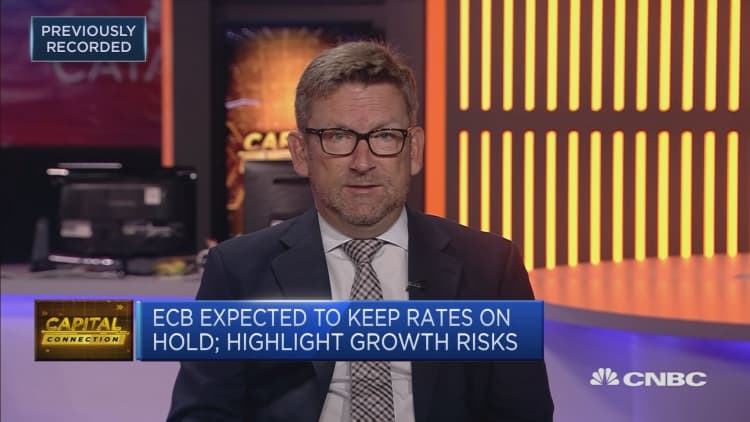U.S. President Donald Trump called it a "very big day for free and fair trade" but his meeting with the EU has failed to provide concrete details on how both sides will fix their differences over trade, analysts said.
Trump received Jean-Claude Juncker, the chief of the EU's executive arm, the European Commission, Wednesday to discuss trade issues given a recent deterioration in their relationship. The White House shook the EU by imposing steel and aluminium tariffs at the start of June and by threatening new duties on its car industry — a key engine for the European economy.
What has been agreed?
In a joint press conference, both leaders promised to work towards zero tariffs on non-auto industrial goods; to reduce barriers and increase trade in services, chemicals, pharmaceuticals, medical products and soybeans.
They also agreed to reform the WTO and that the European Union will buy more liquefied natural gas from the United States. Most importantly, they agreed to not impose new tariffs on one another while they work together on these issues.
"The U.S.-EU agreement to negotiate tariff reductions and to increase U.S. exports to the EU represents an incremental de-escalation of trade tensions between the two sides and lowers the risk of new U.S. tariffs on auto imports, at least in the near term," Goldman Sachs said in a note Wednesday.
The bank added, however, that "the news is not uniformly positive."
"The lack of specifics in today's U.S.-EU announcement raises the possibility that the negotiations could falter at a later stage, as U.S.-China negotiations did earlier this year."

The U.S. claimed last May it had put the trade war with China "on hold" as both countries initiated meetings to discuss their trade relationship. However, such talks ended in early June without any agreement and with the Chinese authorities refusing to buy more American products.
Trump and Juncker also vowed Wednesday "to resolve the steel and aluminium tariff issues and retaliatory tariffs" but without adding any detail on how that's going to take place. The EU imposed duties on $3.3 billion worth of American goods last month in response to the metal tariffs Trump abruptly imposed.
James Nixon, chief economist at Oxford Economics, also told CNBC that there is "massive uncertainty" as to what Wednesday's deal means. He added, however, that it seems the White House is returning to a "kind of multilateral relationship and trade dealings, which to be honest we haven't seen from the United States yet."
Elsewhere, UniCredit called the deal "vague" and one that "failed to elicit excitement among investors in Asia."
Is there a winner?
"The real winner here would appear to be the European Union. The U.S. auto tax threat was reversed in exchange for nothing that means anything," Paul Donovan, chief economist at UBS Global Wealth Management said in a note Thursday morning.
According to Donovan, even though the EU promised to buy more soybeans, it doesn't actually have the power to force European farmers to purchase more from the United States. "The U.S. is already the largest exporter of soybeans to the EU. There are no subsidies, trade taxes or quotas on soybeans in the EU. Private farmers decide whether to buy more soybeans or not," he said.
However, some argue that Trump is in fact the winner out of Wednesday's meeting.
"For Trump not to follow through on a threat is not a concession! Instead it rewards Trump's behavior: he can bully trading partners, even those of equal size - like the EU - with threats of tariffs. And that's problematic for future EU-US trade discussions and global trade," Rem Korteweg, head of the Europe in the World unit at think tank Clingendael, said on Twitter.
What about China?
"We do not believe that recent positive developments regarding U.S.-EU trade should be interpreted as a reduction in risk in the other major trade dispute, with China. In fact, they likely mean the opposite," Goldman Sachs said Wednesday.
China has tried to get closer to Europe amid the several tariffs that Trump has imposed on Beijing. In fact, both Europe and China agreed earlier this month to exchange some market access and thus speed up negotiations towards an investment agreement. But China might ultimately find itself isolated if the EU and the U.S. stick closer together.
According to Goldman Sachs, the Trump administration might also use the agreement with Europe "to win concessions from other trading partners, like China."
China has put forward retaliatory tariffs against the U.S. worth $34 billion after the White House advanced with the same amount of duties on its imports earlier in July. China raised duties on American goods such as pork, electric vehicles and soybeans.
Europe sighs
For now, Europe can breathe a sigh of relief now that the imminent threat of getting slapped with 20 percent tariffs on its carmakers has disappeared. This could prove an economic boost to the region where business confident has been hit by trade fears.
Holger Schmieding, German economist at Berenberg Bank said in an email that if the U.S. and Europe take negotiations over trade seriously "euro zone business confidence can recover this autumn."
"This should allow the euro zone to overcome its current soft patch with a return to annualized growth rates of around 2 percent from the fourth-quarter onwards," he said.
Data out on Wednesday showed a slowdown in confidence in the largest European economy – Germany. According to the Ifo institute's monthly business climate data business confidence fell in July to 101.7 from 101.8 a month before. Business expectations also dropped to 98.2 from 98.5.
Analysts said that trade tensions between Europe and the U.S. were at the forefront of the deteriorating business climate.
Schmieding described the agreement between Trump and Juncker as "not really a deal yet", "but it is a step away from the brink."


